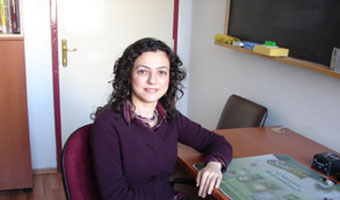The Ohio University Ohio State University Ring Theory Seminar presents Dr. Pinar Aydogdu (Hacettepe University, Ankara, Turkey) discussing “A Family of Examples of Generalized Perfect Rings” on Friday, Oct. 20, in Cockins Hall 240, OSU-Columbus from 4:45-5:45 p.m.

Dr. Pınar Aydoğdu
ABSTRACT: Inspired by the fundamental work of Bass \cite{bass} on perfect rings and projective covers, A.~Amini, B.~Amini, M.~Ershad and H.~Sharif proposed in \cite{A} to study a class of rings that they named \emph{generalized perfect ring.
Let $R$ be a ring, and let $F$ and $M$ be right $R$-modules such that $F_R$ is flat. Following \cite{A}, a module epimorphism $f\colon F\rightarrow M$ is said to be a \emph{$G$-flat cover} of $M$ if $\mathrm{Ker}\, (f)$ is a small submodule of $F$. Still following \cite{A}, a ring $R$ is called {\em right generalized perfect} (right $G$-perfect, for short) if every right $R$-module has a flat cover. A ring $R$ is called {\em $G$-perfect} if it is both left and right $G$-perfect. It is clear from the definition that right perfect rings are right $G$-perfect rings, and also that von Neumann regular rings are $G$-perfect rings. Looking for a characterization of $G$-perfect rings, it was showed in \cite{A} that if $R$ is right $G$-perfect, then the Jacobson radical $J(R)$ is right $T$-nilpotent and, hence, idempotents lift modulo $J(R)$. Moreover, it was also proved that if $R$ is right duo (i.e. all right ideals are two-sided ideals) and right $G$-perfect, then $R/J(R)$ is von Neumann regular. It was claimed that it was reasonable to conjecture that a right $G$-perfect ring is von Neumann regular modulo the Jacobson radical. In this work, we answer this conjecture in the negative by constructing semiprimitive $G$-perfect rings that are not von Neumann regular. (This is a joint work with Dolors Herbera.)
\begin{thebibliography}{99}
\bibitem{A} A. Amini, B. Amini, M. Ershad and H. Sharif. \emph{On generalized perfect rings}, Comm. Algebra \textbf{35} (2007), 953–963.
\bibitem{bass} H. Bass. \emph{Finitistic dimension and a homological generalization of semi-primary rings}, Trans. Amer. Math. Soc. \textbf{95} (1960), 466–488.
\end{thebibliography}
















Comments